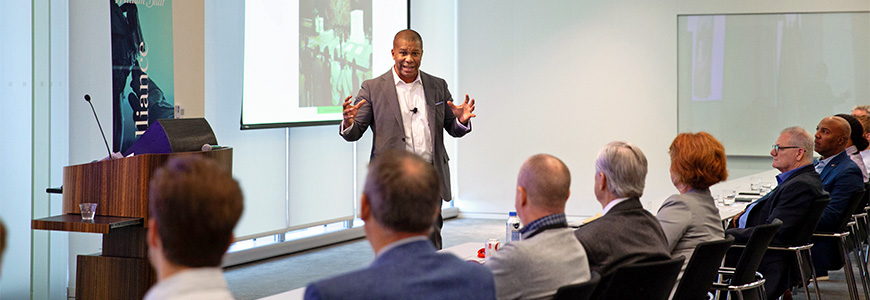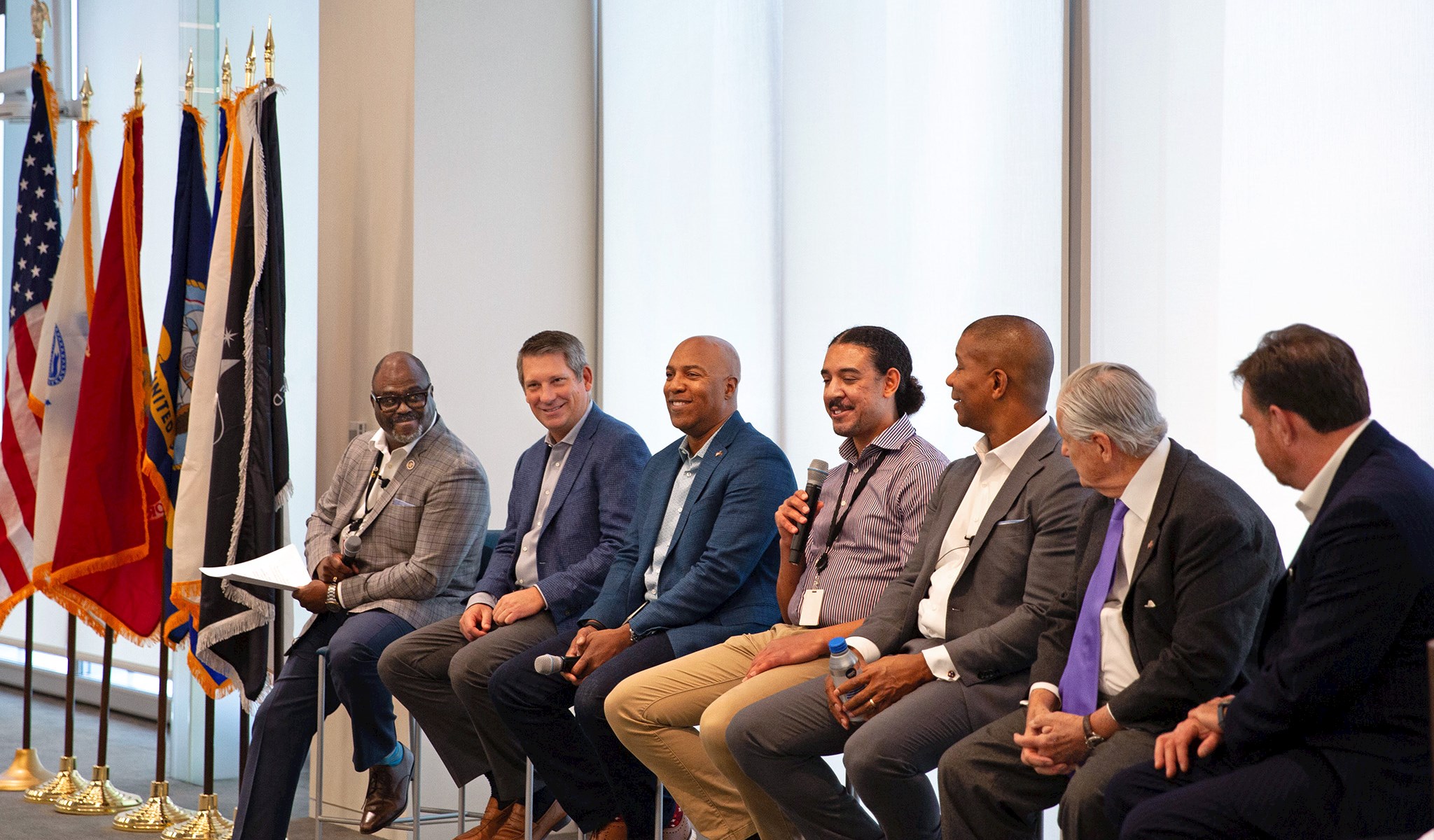Former U.S. Army Captain Wes Becton shared his thoughts on resiliency learned during his military career and what it means during hard times at William Blair’s annual Veterans Day celebration.
Becton reminded the audience that experiences of freedom in America are made possible because veterans have sacrificed and served our country to defend those freedoms that are often taken for granted.
“At any given moment,” Becton said, “there’s some young man or young woman standing guard or on a ship that’s scared out of their mind, homesick, probably really cold or hot, depending on where they are. But they’re doing that, not for themselves, but for us. They’re experiencing all of that so we can enjoy the freedoms we enjoy here in the United States of America.”
Becton recognized the 40 veterans at William Blair and thanked the William Blair Veterans’ Alliance, a business resource group at the firm and host of the 9th annual colleague event on November 8.
Becton, who comes from a family of military veterans, went to 17 different schools from kindergarten through college, including a high school in Stuttgart, Germany. He is now an executive certified coach and member of the International Coach Federation after spending more than 20 years as a healthcare executive, leading multispecialty physician practices and surgery centers and working in academic medicine, eventually serving as the president of an ophthalmology practice. Becton earned degrees from Valley Forge Military Academy and College, George Washington University (bachelor’s degree), and Lewis University (master’s degree).
Working for Something Greater Than Yourself
Becton shared his insights through the lens of his varied military career and experiences. After attending a military school outside of Pennsylvania, he went to the junior college at Valley Forge Military Academy and College, serving as the senior cadet and being commissioned at 19 years old.
While living in Washington, D.C., Becton had one of the most exciting opportunities: serving in the Army’s ceremonial unit, also known as the Old Guard. At any given moment, he explained, he would be standing within arms’ distance of the president.
“I served on one of the most hallowed pieces of ground in the country,” Becton said. “I commanded the company that included the Tomb of the Unknown Soldier, Army Drill Team, and all the soldiers who did the ceremonies at the Pentagon, White House, and all over Washington, D.C. It was a wonderfully enriching assignment.”
To Becton, the military allows people to serve in something greater than themselves.
“Most of us had a sense of humility about what an honor and privilege it is to be able to represent the U.S. to visiting heads of State, heads of government, or visiting military dignitaries,” Becton said.

The Lessons Learned
Throughout his military and professional career, Becton has interacted with people from all walks of life. Throughout the Veterans’ Day event, he returned to the notion that everyone who has served in the military has stories that can provide incredible lessons.
The first story Becton told described his relationship with Jerry Cashion, who served as a platoon leader with him. Cashion grew up in Pulaski, Tennessee; despite their vastly different upbringings, Becton and Cashion quickly became best friends.
“If I needed something at any given moment,” Becton said,” he would give me the shirt off his back – and the feeling was mutual. When you’re cold, tired, hungry, afraid, homesick, or miserable, and somebody offers to help you—you don’t care what they look like, where they’re from, or how much money they have in their bank account. You’re just grateful for their help.”
When Becton was the executive director of a surgery center, he met Abner Ganet, who volunteered in his organization. It was there that they talked about what it was like for Ganet to grow up as a young Jewish child on the west side of Chicago, dealing with bullies. Becton credited Ganet for opening doors for him, including making it possible for him to become a member of the Board of Trustees at Elmhurst University.
Ganet, only 16 years old when he enlisted in the Army during World War II, was assigned to the First Infantry Division and fought across France.
During his later years, Ganet found purpose through volunteer work. When Ganet was escorting visitors on Elmhurst’s campus, he met Elie Wiesel, Romanian-American writer and professor, former Nobel laureate, and one of the most famous survivors of the Holocaust. After Ganet and Wiesel started talking, they realized when Ganet liberated the Buchenwald concentration camp, where Weizel was, the day before his execution.
“Abner remembered the exact day of the week, day of the month, and the time of the liberation,” Becton said. “From that point on, Abner made it his mission to talk to anybody who would listen to him about his experiences.”
Becton also talked about his father, Lt. Gen (Ret) Julius Wesley Becton Jr., who fought in three wars: World War II, the Korean War, and the Vietnam War. When his father enlisted in the Army at the end of World War II, he was in a segregated unit.
“History will tell you the military was actually desegregated in 1947,” Becton said. “Even though the law had changed, people didn’t enforce it. The reason why the units became desegregated wasn’t for social justice reasons – it was because the U.S. was getting their butts kicked in the war. They learned they were stronger together than separated.”
While there is no one definition for “resiliency,” Becton told attendees that each person’s lived experiences can combine to create a resilient culture, and building relationships with people different from you will be the most rewarding way to achieve that resilient culture.
“There’s one thing the military definitely has on straight,” Becton said, “and it’s something the rest of us can learn a lot from. There’s an idea of bringing people together and allowing them to work for something greater than themselves. That’s a freedom we should never take for granted.”



